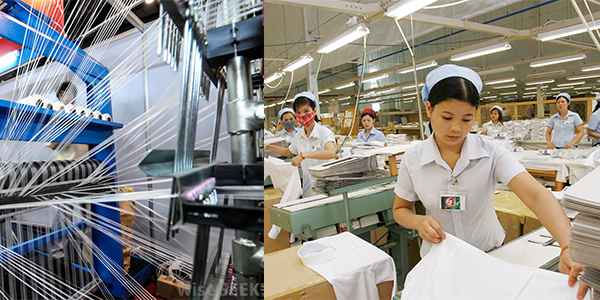Career in Textile Engineering
[one_half][ads1][/one_half]Career in Textile Engineering – Textile Industry is one of the oldest industry in India. Also known as Textile Technology. Career in Textile Engineering studies both physical & chemical principles from scientific and engineering methodologies, which are then implemented for production & processing.
Career in Textile Engineering would involve manufacturing of various types of fabrics both natural & synthetic, planning and development of new technology, production of machinery. In India alone, The textile industry provides employment to more than 30 million people.
Being a Scientific realm. Career in Textile Engineering is an innovative field, dealing with designing, distributing, manufacturing and selling clothing & apparels. While implementing the engineering skills on production and processing of different kinds of fabrics, textiles and yarns from textile fibers.
Career in Textile Engineering has been creating waves in recent times.
Textile engineering is the study of textile production, processing and it’s compatibility for the use of the common man. It combines the principles of engineering with specific knowledge of textile equipment and processes.
This field of engineering draws inputs from various other branches of engineering like instrumentation, computer, structural, electronics, mechanical engineering and chemical.
Job Profile
Textile engineering/ Technology deals with the application of engineering and scientific principles to the design and control of all aspects of fiber, apparel and textile processes, its machinery and products.
Some Tasks of a Textile Engineer are
- Producing non-woven materials.
- Spinning fibers into yarn and weaving or knitting yarn into fibers.
- Advising and providing consultancy to others on technical aspects of the business.
- Performing quality assessment on natural fibers and developing man made fibers.
- Overseeing the printing, dyeing and finishing processes.
- Undertaking quality evaluations of materials, & checking the quality of the final product.
- Sourcing fabrics and accessories.
Some Job profiles for a Textile engineer are
- Process engineer.
- Operations trainee.
- Technical salesperson.
- Development engineers.
- Quality control supervisors.
- Technical services/ sales manager.
- Medical textiles Engineer.
- Technologists.
According to its texture and usage. Textiles are mainly classified into two types.
Technical Textiles
They are made of nano wires & zinc oxide which enables protection from radiation and fires.
Medical Textiles
These textiles include gauze and bandage. They are also used as orthopedic implants, vascular grafts, artificial tendons, heart valves, sutures, and even as artificial skins and artificial ligaments.
SKills Required
- A textile engineer should have an excellent observational ability, should possess an eye for detail.
- A textile engineer must possess or develop excellent communication skills
- He/ she should posses awesome analytical and problem solving skills.
- Must have an aptitude for producing new and improving upon new textile fabrics.
- Should have a flair for solving technical problems relevant to textile manufacturing processes.
- Textile engineers will have multiple tasks at hand. Hence Textile engineers should have good organisational skills.
Salary Package
- In the beginning, Career in Textile Engineering graduates may expect a salary anywhere between 12,000 INR to 18,000 INR a month.
- With experience and skillfulness, comes higher pay scales. With an experience of 3-4 years.
- A Textile engineer can expect a salary up to 50,000 INR a month in leading national or international companies.
Job Prospects
A textile engineer may find a job in a wide variety of industries.
Some of the possible career paths for a textile engineer are quality control, corporate management, production control, process engineering, R&D, Technical sales.
Textile engineers can attain specialization in any of these fields ,such as
- Computer application in textile.
- Technical textiles.
- Fiber Science technology, Textile chemical technology, etc.





